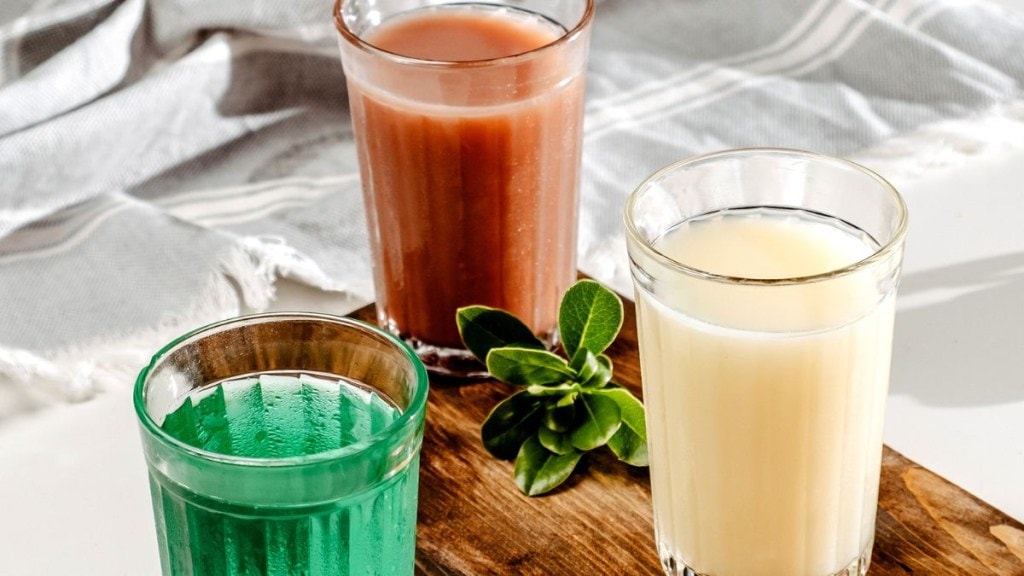Gut troubles are something most of us have faced—bloating after a heavy meal, discomfort from too much spice, or just that uneasy feeling after a long day. While the world is buzzing about kombucha, kefir, and other trendy probiotic drinks, Indian kitchens have quietly been serving gut-friendly beverages for generations. Drinks like buttermilk, kanji, and sol kadhi weren’t marketed as ‘health tonics,’ but families knew their magic: soothing digestion, calming the stomach, and keeping the gut happy.
Dt. Vasundara Padma, Chief Registered Dietitian at Apollo Hospitals, Visakhapatnam, says, “These traditional drinks are simple, natural, and incredibly effective. They’ve been supporting digestion in Indian households for decades, long before probiotics became a global trend.”
Indian probiotic drinks for gut health
Buttermilk (Chaas):
Let’s start with the humble chaas, or buttermilk. Many Indians grew up sipping it after meals. Essentially, it’s diluted curd, churned with water and seasoned with roasted cumin, rock salt, and sometimes coriander or curry leaves. In Tamil Nadu, it’s called neer mor; in Gujarat, it’s a daily staple; in Maharashtra, it’s part of summer survival.
Dt. Padma adds, “The live cultures in curd help balance gut bacteria, improve digestion, and cool the body after spicy foods. For most people, it’s a simple yet highly effective digestive aid.”
However, she cautions that those lactose intolerant or allergic to dairy should avoid buttermilk. People with irritable bowel issues might also want to tread carefully, especially if spices are added. A dairy-free alternative could be cumin-ginger herbal water or lightly infused fennel tea, both gentle and soothing.
Kanji:
Kanji is a North Indian winter drink made by fermenting black carrots or beets with mustard seeds in water. It has a slightly fizzy texture, with a punchy, sour, earthy flavor that might take some getting used to.
Dt. Padma says, “Kanji is a powerhouse of natural probiotics, completely free of added sugar or flavoring. Fermentation creates beneficial bacteria that support gut health, making it an excellent choice, especially after antibiotics or when aiming to boost digestive flora.”
But she notes, “Kanji isn’t for everyone. Those with histamine intolerance, autoimmune conditions, or sensitivity to fermented foods should avoid it. In such cases, fresh beetroot or carrot juice with a squeeze of lemon and a pinch of black salt works wonderfully for gut support.”
Solkadhi:
Sol kadhi, a coastal favorite, combines kokum and coconut milk into a tart, creamy, pink-hued drink. Traditionally consumed after seafood meals, it soothes the stomach and cools the body.
“While sol kadhi isn’t fermented, kokum contains antioxidants and anti-inflammatory compounds that aid gut health. The healthy fats in coconut milk also support digestion and post-meal recovery, making it both delicious and functional,” Dt. Padma explains.
Those who avoid dairy or follow a low-fat diet can enjoy sol kadhi, but people with coconut allergies should skip it. A simple alternative is tamarind water spiced with cumin and mint—still cooling, tangy, and gentle on the gut.
Why these drinks are gut-friendly
In an era of imported kombucha brands and fancy probiotic labels, these Indian drinks remind us that gut health doesn’t require a global supply chain. Dt. Padma points out, “Kombucha and kefir are great, but our traditional recipes are equally powerful. They’re accessible, affordable, and come from years of practical wisdom.”
She adds, “It’s important to remember that gut health isn’t just about trendy products. A bowl of curd with a pinch of spices, or a glass of kanji or sol kadhi, can go a long way in maintaining digestive balance.”
Adding these drinks into your daily routine, with modern probiotic options, creates a balanced and sustainable approach to digestive wellness.”
Sometimes, the most powerful health drinks aren’t the ones you buy off the shelf, they’re the ones your grandmother made. With buttermilk, kanji, and sol kadhi, Indian kitchens have mastered the art of gut-friendly nutrition.

